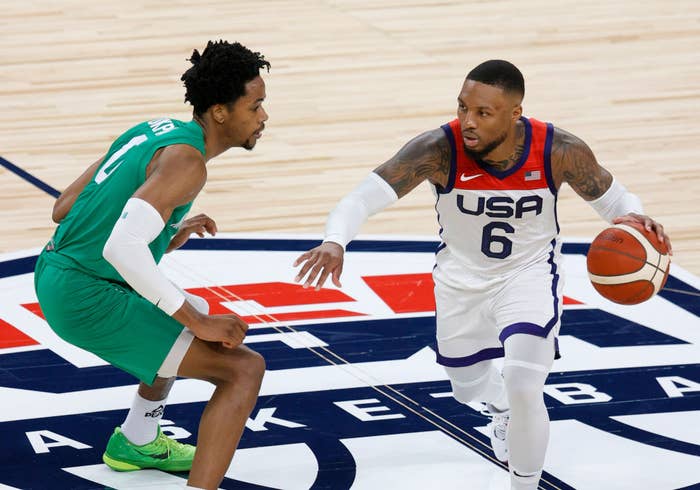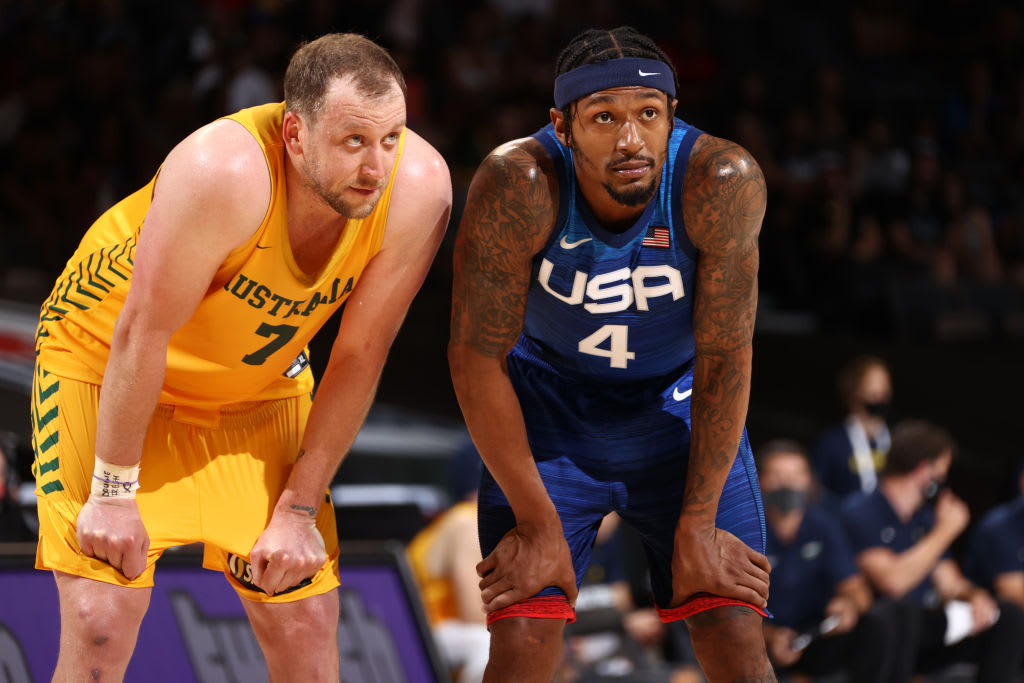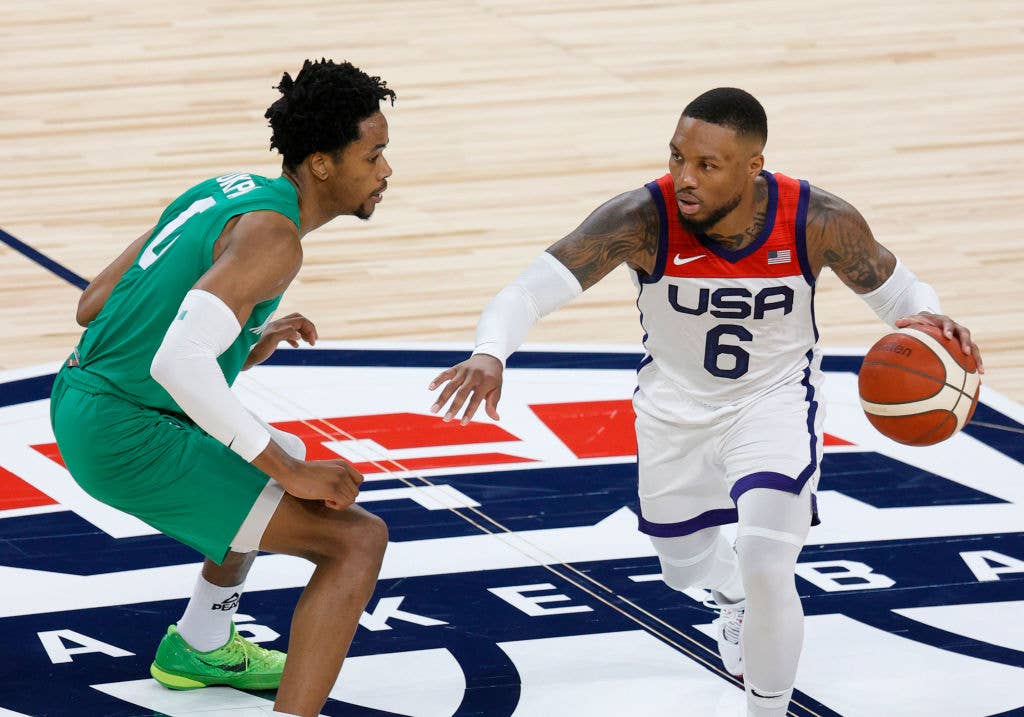
The first loss was shocking. The second was embarrassing. And even if both games don’t really count for anything, they happened, they made headlines, and it raises a serious question for basketball fans ahead of the Tokyo Olympics.
How vulnerable is Team USA?
Succinctly speaking, vulnerable. Losses in exhibition games earlier this week to Nigeria (30-point underdogs) and Australia (16.5-point underdogs) served as a sobering reminder that America isn’t the international basketball powerhouse many always expect it to be. Despite being massive favorites to win gold and featuring a roster stacked with more of the best basketball players than any other team in world, Team USA can’t just show up and beat anybody when Olympic competition tips July 25th.
Not when it’s barely had time to practice and play together after an arduous season. Not when a team full of NBA superstars has to adjust to a different brand of basketball. And, most importantly and notably, not when the collective talent level of teams around the world is stronger than ever.
Savvy basketball fans probably already knew most of that before Team USA’s shocking results dominated the basketball news cycle for a couple of days in the middle of the NBA Finals. But it bears repeating roughly a week before the Games begin. Long gone are the days when the US, starting with 1992’s iconic Dream Team, would scare the shit out of opponents during warm-ups. International basketball has evolved exponentially since Michael Jordan and Co. wowed the world in Barcelona.
“The 30,000-foot perspective of USA basketball is the world has changed,” says Fran Fraschilla, NBC Olympics basketball analyst and noted expert on international basketball. “You can blame the Dream Team, you can blame Hubie Brown and Jack Ramsey who went overseas and taught the game. We still have the best players in the world. We’re still the favorite in Tokyo. But the simple fact is the globe has shrunk. And there’s no better indication of the globe shrinking than three of the five players on the NBA First-Team all-league were born out of the States.”
He’s of course talking about NBA MVP Nikola Jokic, Luka Doncic, and Giannis Antetokounmpo. Out of those three superstars, only Doncic will be playing in the Olympics with Slovenia. But many of the 12 teams in the competition—like Australia, France, and Spain—have a number of notable NBA players on their roster. And many of them will arrive in Tokyo with superior chemistry, having in some cases played together for up to a decade in international tournaments, unlike Team USA.
“Although we have some of the greatest names in the world, FIBA is a different sport. It’s more physical, it takes more continuity and chemistry and hopefully our guys will learn that in the next few weeks.” — Fran Fraschilla
Only Kevin Durant, Draymond Green, and Kevin Love have won a gold medal. Besides those three, Khris Middleton and Jayson Tatum are the only other players on the 12-man roster with major international experience. Those two were part of the disastrous 2019 USA World Cup squad that embarrassingly finished seventh in China.
Lack of continuity and practice time thanks to the NBA season bleeding into the summer are two of the biggest reasons why Team USA lost to Nigeria and Australia, says Fraschilla. And that could easily be why Team USA gets picked off in the knockout stage—where it’s just like the NCAA Tournament, win and advance or lose and go home—before getting a chance to play for the country’s fourth straight gold.
“We just understand that we can’t disrespect our opponents,” guard Bradley Beal told Complex Sports last week before entering health and safety protocols Wednesday. “We have that mindset that we have to be better every play, every possession counts because there are fewer possessions, too—only 10-minute quarters. We have to really dial in and be ready to go because every team is going to be really tough.”
Speaking of those 10-minute quarters, if you don’t know now you know that international basketball is a way different beast than the NBA. The quarters are obviously shorter, the lane is wider, the 3-point line’s closer, and the rules—like only five personal fouls allowed and no basket interference—are an adjustment. It’s also way more rugged than today’s NBA that hardly allows for any physicality during the regular season. Fraschilla describes international ball as “the NBA circa the 1990s.” That’s music to old school Knicks fans’ ears, but for today’s players it’s foreign. The Olympics will feature hand checking, fewer whistles, rugged play, and require more of a premium on team concepts.

“Although we have some of the greatest names in the world, FIBA is a different sport,” says Fraschilla. “It’s more physical, it takes more continuity and chemistry and hopefully our guys will learn that in the next few weeks.”
After Team USA took out Argentina in its third exhibition game and improved on all the things it sucked at against Nigeria and Australia—like owning the boards, shooting better from beyond the arc, and controlling the paint—the emergency sirens were muted. “It was better,” coach Gregg Popovich said after the 108-80 victory. “Bit by bit, every day I hope.” But those sirens will start blaring again should Team USA fall to Australia Friday and/or Spain Sunday as it finishes its exhibition schedule.
Fraschilla was in Las Vegas to observe some of Team USA’s games and while he says they are the clear-cut favorite to win gold, teams like Australia, up-and-coming Nigeria, and even a past-its-prime Spain will be extremely dangerous when the knockout stage arrives. As long as Team USA—still missing Middleton, Jrue Holiday, and Devin Booker as they finish up the NBA Finals—develops trust, Fraschilla believes they’ll be fine.
“What I saw in Vegas was just trying to figure out everybody’s roles,” he says. “Sometimes you can actually defer too much when you’re on a great team like this. It can’t be all Kevin Durant down the stretch, like it’s been in the past. There’s a balancing act just trusting my own skills and trusting my teammates that are great players.”
And for those still worried Team USA is way too vulnerable and could easily suffer the same indignity the 2004 squad did, returning from Athens with the bronze, Fraschilla has a silver lining. Paris quickly looms. And after that it’s Los Angeles.
“When our NBA season ends at a normal time and many of our stars raise their hand to play,” he says, “I don’t think that anybody is as prohibitive a favorite anytime soon as we will be for the next couple of cycles.”

